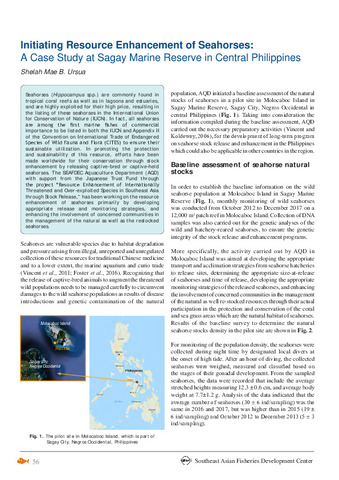Coral culture and transplantation and restocking of giant clams in the Philippines
- Global styles
- MLA
- Vancouver
- Elsevier - Harvard
- APA
- Help
Share
抄録
Recently, the Pew Project (2001 to 2005) of the senior author entitled ‘Coral reef habitat and productivity enhancement through coral transplantation and giant clam restocking’ was implemented with the aim to improve the biodiversity and productivity of stressed coral reef habitats in 10 selected demonstration sites in the Philippines. These were meant to serve as models for other communities. Transplantation of corals and reseeding of giant clams were the approaches. Nubbins or small fragments from nearby large coral colonies and abundant solitary forms were transplanted to the target sites. Care was exercised to avoid or reduce any negative impacts on the natural source communities. Only cultured giant clams were used, specifically the threatened Tridacna gigas at sizes that would ensure their chances of survival in the wild (approximately 20-30 cm shell length). Following deployment, monitoring activities were undertaken, focusing on macro-invertebrates and fish, as well as the assessment of the survival and growth of experimental animals. Liaison work was done with local communities to raise their environmental awareness and to ensure their cooperation. This manuscript draws principally from results of the Pew Project. At present, two other restoration projects supported by the European Union and the Global Environment Facility Coral Reef Targeted Research Project are being implemented at the Bolinao Marine Laboratory of the University of the Philippines Marine Science Institute (UP-MSI) in Pangasinan. These projects are testing the efficiency of floating and standing coral nurseries in growing coral nubbins in addition to transplanting fragments or branches of corals to restore degraded coral reefs.
Suggested Citation
Gomez, E. D., Cabaitan, P. C., & Vicentuan, K. C. (2006). Coral culture and transplantation and restocking of giant clams in the Philippines. In J. H. Primavera, E. T. Quinitio, & M. R. R. Eguia (Eds.), Proceedings of the Regional Technical Consultation on Stock Enhancement for Threatened Species of International Concern, Iloilo City, Philippines, 13-15 July 2005 (pp. 39-48). Tigbauan, Iloilo, Philippines: Aquaculture Department, Southeast Asian Fisheries Development Center.
Type
Conference paperISBN
9789718511794
Related items
Showing items related by title, author, creator and subject.
-
Evaluation of post-release behavior, recapture, and growth rates of hatchery-reared abalone Haliotis asinina released in Sagay Marine Reserve, Philippines
Lebata-Ramos, Ma. Junemie Hazel ; Doyola-Solis, Ellen Flor C.; Abrogueña, Jeff Bogart R.; Ogata, Hiroshi; Sumbing, Joemel G.; Sibonga, Rema
; Doyola-Solis, Ellen Flor C.; Abrogueña, Jeff Bogart R.; Ogata, Hiroshi; Sumbing, Joemel G.; Sibonga, Rema  (Taylor & Francis, 2013)
The lucrative returns brought by abalone fisheries have caused overexploitation and decline of the wild population. In the Philippines, the Aquaculture Department of the Southeast Asian Fisheries Development Center has ...
(Taylor & Francis, 2013)
The lucrative returns brought by abalone fisheries have caused overexploitation and decline of the wild population. In the Philippines, the Aquaculture Department of the Southeast Asian Fisheries Development Center has ... -
Initiating resource enhancement of seahorses: A case study at Sagay marine reserve in central Philippines
Ursua, Shelah Mae B. (Secretariat, Southeast Asian Fisheries Development Center, 2017)Seahorses (Hippocampus spp.) are commonly found in tropical coral reefs as well as in lagoons and estuaries, and are highly exploited for their high price, resulting in the listing of these seahorses in the International ...







